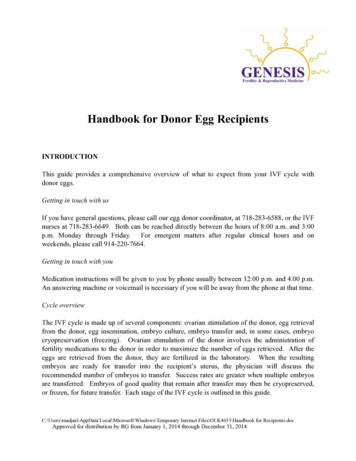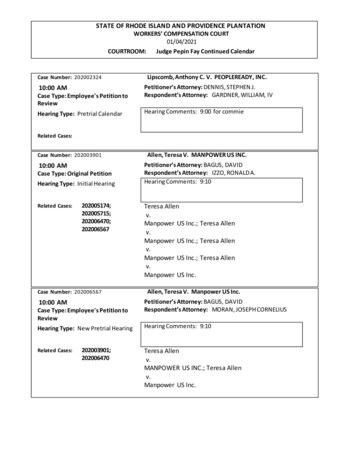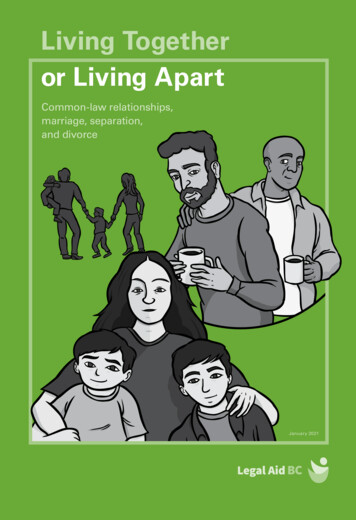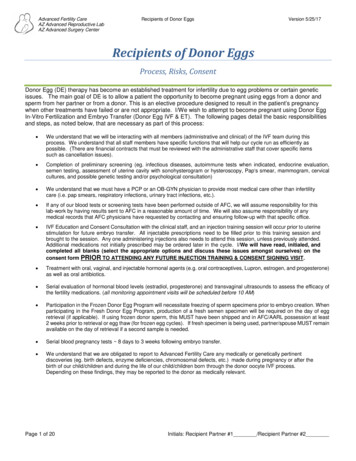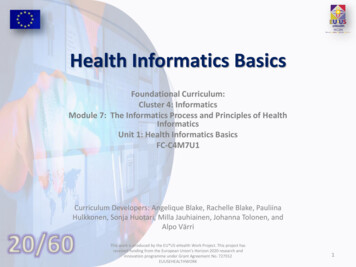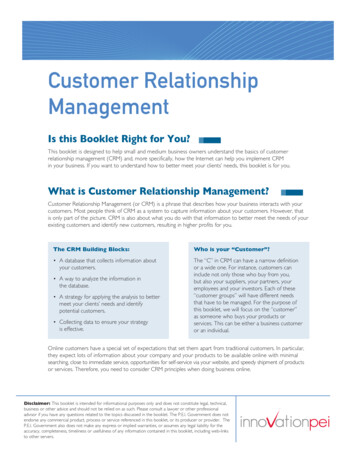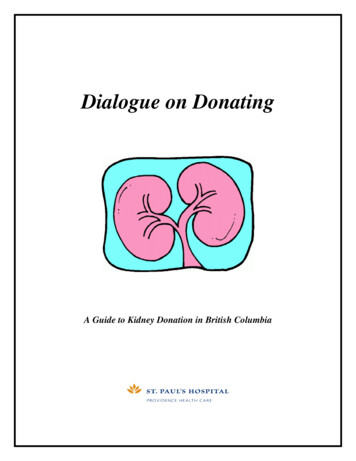
Transcription
Dialogue on DonatingA Guide to Kidney Donation in British Columbia
Contact InformationSt. Paul’s Hospital - Providence Health CareLiving Kidney Donor Program1081 Burrard StreetVancouver, British ColumbiaV6Z 1V6Phone: 604-806-9027Toll free: 1-877-922-9822Fax: 604-806-9658Email: donornurse@providencehealth.bc.caBritish Columbia TransplantLiving Kidney Donor ProgramWest Tower, 3rd Floor555 West 12th AvenueVancouver, British ColumbiaV5Z 3X7Phone: 604-877-2240Toll free: 1-800-663-6189Fax: 604-877-2111British Columbia’s Children’s HospitalTransplant Nurse Clinician4480 Oak StreetVancouver, British ColumbiaV6H 3V4Phone: 604-875-3604Fax: 604-875-2943Dialogue on DonatingFebruary 20091
Table of ContentsIntroduction . 3General Principles 4Pre-Evaluation Guidance and Information . 5Information About Kidney Transplantation 7Phases of the Living Donor Assessment 10Surgical Aspects of Kidney Donation 20Post-Operative Information . 25Long-Term Follow-Up 28Appendix A: Living Donor Paired Exchange Program. . . 31Appendix B: Living Anonymous Donor Program 33Appendix C: Living Organ Donor Expense Reimbursement Program . 35Dialogue on DonatingFebruary 20092
INTRODUCTIONThe information in this booklet will be helpful if you want to learn more about theprocess of living kidney donor evaluation and the details of kidney donor surgery. Thedecision whether to donate a kidney is a very personal one and there is no right or wrongchoice. The Living Donor Team at St. Paul’s Hospital needs to ensure that a potentialdonor is coming forward without pressure, coercion or incentive and it is important thatshe or he understand this when entering the testing process. The donor should know thatshe or he might decline to donate at any time. The decision has to be the one that is bestfor the donor and the Living Donor Team is committed to supporting the donorthroughout this decision making process.Our living kidney donor program considers this booklet an important part of the consentprocess for those people who ultimately serve as kidney donors. A potential kidney donormust understand all aspects of their evaluation as well as the risks and benefits of donorsurgery.All information disclosed during the donor evaluation is confidential and remains withthe Living Donor Team. Therefore, it is important that the donor and recipient maintaingood communication throughout the donor’s evaluation. The recipient will not receiveany information about the donor’s testing or suitability from the Living Donor Team(although the team is available to assist if the donor or recipient are experiencingfrustrations or difficulties).Dialogue on DonatingFebruary 20093
GENERAL PRINCIPLES UNDERLYING THE LIVING DONOREVALUATION1. The potential donor must have a blood group that is compatible with therecipient’s blood group. Potential donors who are known to be blood groupincompatible with the recipient may choose to participate in the Living DonorPaired Exchange Program. (Appendix A)2. The recipient must not have antibodies against the potential donor’s kidney,which would lead to quick rejection of the kidney. Potential donors who areineligible because of recipient antibodies may choose to participate in the LivingDonor Paired Exchange Program. (Appendix A)3. The potential donor must be sufficiently healthy and fit to undergo a majoroperation with very little risk of complications.4. The potential donor’s pre-operative kidney function must be strong enough toexpect normal kidney function following removal of one kidney.5. The potential kidney donor must not have any medical condition that maypossibly be transmitted to the recipient (i.e.: viral hepatitis or cancer).6. The potential donor must be 19 years of age or older.7. The potential donor must know and understand the operative risks and long-termrisks of the donor operation.8. The potential donor must have a pre-existing relationship with the recipient. Thisis to ensure that both people can make an informed decision about theappropriateness of the offer to donate and the consequences of accepting the offer.Potential donors may participate in the Living Anonymous Donor Program(Appendix B) if they do not personally know any individual in need of a kidneytransplant.9. The potential donor must not receive money or other valuable incentives to donatea kidney that they would otherwise not consider donating.10. The potential donor must have enough psychological, social and financialresources to withstand the surgery and recovery period with minimal personalhardship.Dialogue on DonatingFebruary 20094
PRE-EVALUATION GUIDANCE AND INFORMATIONThere are some things you should know before starting an evaluation as a potentialkidney donor.1. Not every patient with chronic renal failure is a candidate for renaltransplantation.A patient with renal failure will need to undergo their own evaluation to determine theirsuitability for transplantation. In many cases, this will happen at the same time thatpotential donors are completing their tests, but there are exceptions. The Transplant Teamand Living Donor Team will discuss matters and it may occur that the intended recipientmust finish their testing before any donor evaluations are allowed to proceed.2. Living donor transplantation is not the only option for patients with renalfailure.When the kidneys fail, there are two treatment options available: Dialysis and kidneytransplant. Dialysis is a treatment that takes over some of the kidney’s function byremoving wastes, excess fluid, and salt from the blood. There are two types of dialysisthat patients with end stage renal disease can choose from: Hemodialysis and Peritonealdialysis. Each type of dialysis has advantages and disadvantages and each requires somerestrictions to lifestyle. Although many people do well for years on dialysis, somedevelop problems that can make dialysis difficult or less effective.As well as living donor transplantation, a dialysis patient may receive a kidney from adeceased donor. Due to the length of the waiting list, patients will have to be on dialysisfor several years before they receive a deceased donor transplant.3. The entire donor evaluation will take some time to complete – often threemonths or longer.The medical questionnaire and basic laboratory tests take a certain amount of time tocomplete and must be reviewed before you can proceed to the special radiologic tests andan interview with the Living Donor Team. Some tests may need to be done several timesto confirm a ‘borderline’ result.If the donor lives outside of British Columbia or Canada the evaluation will take longerthan that for a B.C. resident.The Living Donor team will not contact you to remind you to do your tests – it is up tothe potential donor to complete their testing and confirm that the Living Donor Teamhas received the results.Dialogue on DonatingFebruary 20095
4. There are risks to the donor evaluation itself.Potential donors need to undergo a large number of laboratory tests as well as some xrays. These tests may lead to the discovery of previously unknown infections, tumours orother medical problems. Even if your health is not affected at the time the problem isidentified, knowledge of the problem may affect future insurability. By law, positivetests for certain infections must be reported to health agencies.The HLA testing (done to determine the “degree of match” between donor and recipient)may reveal the true identity of family relationships that some family members may notwish exposed.Intravenous injections of contrast or radioisotopes are required for certain x-ray studiesand these injections may cause severe allergic reactions (although this is very rare).Dialogue on DonatingFebruary 20096
INFORMATION ABOUT KIDNEY TRANSPLANTATIONKidney transplantation is the preferred treatment option for most people with kidneyfailure. A kidney transplant provides a patient with the best chance to return to a normallife, free from the restrictions of dialysis. Many studies have shown that people usuallylive longer, healthier lives with a kidney transplant as compared to dialysis. Most peoplestate that they have an improved quality of life following transplant.Prior to, or at the same time as, a living donor work-up, recipient suitability for transplantmust be assessed. The Transplant Team assesses each potential recipient individually todecide if the benefits of a kidney transplant outweigh the risks. The Transplant Teammust believe that the person is healthy enough to survive the surgery and benefit fromgetting a transplant.Kidney transplantation is considered a treatment rather than a cure for kidney disease. Itis considered when a patient’s kidney function is less than 20%, there is no hope ofreversing the kidney failure and the patient is having symptoms of kidney disease.Following a transplant, medications to suppress the recipient’s immune system andprevent rejection must be taken as long as the transplanted kidney is in place. Thesepowerful medications have a number of side effects and risks that are explained carefullybefore a patient decides to have a transplant. It is possible that a kidney transplant may betechnically successful and functioning well but the patient has complications related tothe anti-rejection medications, which limits the overall success of the procedure.A transplanted kidney can function well for many years. Recent Canadian statistics showthat approximately 80% of transplanted kidneys are still working well five years after thesurgery. However, rejection of the transplanted kidney can occur even if medications aretaken faithfully. Approximately 20% of patients will experience an episode of rejection.Rejection most often occurs in the first six months after surgery but it can happen at anytime. With early detection and proper management, the rejection is usually treatable andthe kidney function preserved. If it is not possible to reverse the rejection, the patient willlose the function of the transplanted kidney and return to dialysis. If a transplant is lostdue to rejection or other reasons, a patient may be considered for a second transplant.There is no known limit to how long a transplant kidney may function (it may last alifetime) but the average length of time before return to dialysis is 18-20 years forliving donor transplantation.Dialogue on DonatingFebruary 20097
Patient and Graft Survival, BC and Canada ComparisonProgramKidney (Deceased AdultDonor)1 Year5YearKidney (Adult Living)1 Year5YearProgramKidney (Deceased AdultDonor)1 Year5YearKidney (Adult Living)1 Year5YearDialogue on DonatingFebruary 2009Patient 4.4%99.1%96.0%Graft 9.8%96.4%89.5%8
If the Transplant Team decides that a patient is suitable for a kidney transplant but theydo not have a living donor, they are placed on the deceased donor waiting list. They arelisted according to their blood type and how long they have been on dialysis. People withcertain blood types may have longer waiting times than others. Currently, in BritishColumbia, it takes about five to ten years after starting dialysis to receive a deceaseddonor transplant.ProgramKidney(Adult Deceased Donor)Year of TransplantAverage Time 950.155.857.657.765.472.660.3Waiting Time by Blood Type* (Deceased Adult Kidney Donor)YearBlood TypeNumber of TransplantsDone in BCAverage Time on Dialysisbefore 152371188997Dialogue on DonatingFebruary 20099
PHASES OF THE LIVING DONOR ASSESSMENTThe purpose of the living donor assessment is to ensure that donation is safe for the donorand that donation will result in a safe and successful kidney transplant. The evaluationincludes a collection of your health history, various blood and urine tests, radiologystudies, and clinical assessments by a nurse coordinator, social worker, and doctors.If you or someone you know is interested in donating a kidney, initial screening will becarried out over the phone or in person.A potential donor must be at least 19 years of age to be considered but there is no upperage limit. Please note that by the time people reach their late 60’s there is often a normalreduction in kidney function making these people less than ideal as donors.Common Conditions That Normally Prevent Kidney Donation High blood pressureDiabetesCancer – even if it has been treatedHeart diseaseVery overweightKidney stonesIf you have any of these conditions, you are unlikely to be suitable as a kidney donor.There are exceptions however, and if you have any doubt about your suitability, weencourage you to discuss matters with the Living Donor Nurse Coordinator.Testing is usually performed in a stepwise fashion so that if the initial tests show that thedonor and recipient are not compatible, no further testing is necessary. If a potentialdonor starts the assessment process, information obtained by the transplant centre isconfidential. Test results will be given to the donor only. In certain cases, and only if thedonor gives permission to do so, the information will be discussed with the recipient andtheir doctors.If a potential donor decides to start testing, arrangements for the tests are madethrough the Nurse Coordinator. The tests can be done at a laboratory close to thehome or work place.If the potential donor lives outside British Columbia, the Nurse Coordinator will needto make special arrangements.Dialogue on DonatingFebruary 200910
Step 1: Initial Health Screen and Compatibility TestingTo ensure kidney donation will be safe for both you and the recipient, there are a varietyof areas we need to ask you about. We do this in a standard way by having you completea detailed medical and social health questionnaire (MSHQ). This will help us gain anunderstanding of your health history, and what your current level of health may be.Transplantation involves a potential risk of disease transmission from the donor to therecipient (i.e. HIV, hepatitis, West Nile virus, cancer etc). Therefore, a screening processis performed for all potential organ and tissue donors. This is a mandatory requirement ofHealth Canada. This MSHQ needs to be completed in order to comply with establishedgovernment regulations and safety guidelines for organ and tissue donation. You will findthat many of the questions in the questionnaire are similar to those asked when donatingblood.A negative blood test does not guarantee that a person is free of infection such as HIVand hepatitis. This is because there may be a period of time between getting the infectionand medical tests being able to detect the infection. Therefore, we also need to ask somequestions about personal activities including sexual practices and lifestyle choices that areassociated with the spread of these diseases. Please be assured that all informationgathered is confidential and is used only to assess your suitability as a donor. Noinformation will be discussed with the potential recipient unless your permission has beenobtained.Also, it is crucial to determine whether the potential donor and the recipient arecompatible. There are some incompatibilities that cannot be overcome with our antirejection drug treatment. The critical compatibility tests are: Blood typing CrossmatchingBlood TypingIf you are blood group:*OAB**ABYou can donate to:A, B, AB, OA, ABB, ABABYou can receive from:OO, AO, BO, A, B, AB* universal donor** universal recipientMatching for the Rhesus (Rh) factor – the ‘positive’ or ‘negative’ part of the bloodgroup – is not necessary for kidney transplantationDialogue on DonatingFebruary 200911
CrossmatchA crossmatch blood test identifies antibodies in the blood of the recipient, which wouldattack the donated kidney as soon as it is transplanted. Therefore, if the crossmatch ispositive, the potential donor cannot donate to that recipient. A negative crossmatch meansthere is no antibody reaction and the donor assessment can proceed. Immediately prior tothe transplant, a repeat crossmatch is done to ensure the result has remained negative.Another test is also done at the same time as the first crossmatch, which is called tissuetyping. Tissue typing determines the degree of “match” between the donor and therecipient. In other words, it determines how closely the donor and recipient’s tissuesresemble each other.In theory, the closer the tissues resemble each other, the less likely there will be rejectionof the kidney. In practice, with modern anti-rejection medications, the degree of matchinghas little influence on the outcome after kidney transplantation. So, cases where there islittle or no matching between donor and recipient are still expected to do very well.If a donor and recipient are blood group incompatible or the crossmatch is positive,the potential donor may choose to participate in the Living Donor Paired ExchangeProgram (Appendix A). If the potential donor does not register in this program thenno further testing is done.The Living Donor Paired Exchange Program is also available to any donor andrecipient pair that are compatible, but both still wish to participate in an exchange.(i.e. this may benefit the recipient in finding a more medically compatible donor)Dialogue on DonatingFebruary 200912
Step 2:Laboratory and X-ray StudiesTo qualify as a kidney donor, the donor must be in excellent health with excellent kidneyfunction. This is to ensure that future health will not be compromised. To evaluate thedonor’s health, further testing is done: Infectious Disease screeningBlood pressure readingsBlood tests including fasting blood testsUrine testsChest x-rayElectrocardiogram (ECG/EKG)Kidney ultrasoundInstructions for these tests are sent to the donor and their family doctor. Potential donorsare encouraged to make an appointment with their family doctor to get an independentopinion about their suitability as a living kidney donor, as well as getting their bloodpressure checked and getting the paper work for the laboratory tests. The tests usuallytake a couple of weeks to complete and can be done at most community laboratories.NOTE: Abnormal test results that prevent kidney donation and require furthertesting or follow-up will be referred back to the family doctor.Infectious disease screening is carried out on all donors. The purpose is to check forinfections which may transmit to the recipient with the transplanted kidney. If the donorshows evidence of infection from HIV, syphilis, Hepatitis B, Hepatitis C or West Nilevirus, we will not be able to proceed with the transplant. Positive test results for someinfectious must be reported to an appropriate health agency for follow-up.Certain extra tests may be required depending on the age, past medical history and familyhistory of the potential donor. For example, some potential donors may need to undergocancer screening tests like pap smears, mammograms, colonoscopy or PSA blood tests ifthey have not been done recently.All tests are reviewed by the Living Donor Team to make sure the donor is a suitablecandidate. If any results are unclear, additional tests may be required.The Living Donor team will not contact you to remind you to do your tests – it is up tothe potential donor to complete their testing and confirm that the Living Donor Teamhas received the results.Dialogue on DonatingFebruary 200913
If the tests in Step 2 are complete and look favourable to the Living Donor Team, alldonors must undergo a nuclear medicine study called a renogram. This is booked at ahospital in Vancouver through the nurse coordinator.During this test, a radioactive tracer is injected into the bloodstream and is excreted bythe kidneys into the urine. A scanner detects the tracer and shows: how well the kidneys are functioning (expressed as a number, ml/min.,normalized for your body weight and height) the percentage of function contributed by each kidney.This test usually takes about 4 hours.Step 3:Team EvaluationIf the results of the testing are suitable for kidney donation and the donor wishes tocontinue with testing, appointments are made with members of the Living Donor Team inVancouver. There are three kidney transplant hospitals in Vancouver (St. Paul’sHospital, Vancouver General Hospital, and British Columbia’s Children’s Hospital).Where the donor goes for their Living Donor Team assessment will depend on where therecipient has been referred.Members of the Living Donor Team include: Transplant Nephrologist (kidney specialist)Transplant Urologist (surgeon)Nurse CoordinatorSocial WorkerAll potential donors will undergo a psychosocial evaluation by an individual with mentalhealth training (e.g. clinical social worker, nurse specialist, psychologist or psychiatrist)in order to determine if the donor will be able to cope with the effects of the donationprocess. There are potential psychosocial and financial risks, and it is the job of theexaminer to explore such issues with the potential donor as part of the informed consentprocess.Dialogue on DonatingFebruary 200914
The following are questions for potential donors to consider prior totheir evaluation by the Living Donor Team:How do I feel about donating to the intended recipient? In some cases, familyconflicts may already exist. In other cases, a potential donor may feel uncomfortable (e.g.about the lifestyle of the recipient) and feels that a conflict could arise after donation.Maybe, one cannot yet pinpoint the reason that she or he is reluctant. Some concerns canbe worked through during the Team appointments and through discussion. It is perfectlyacceptable for a potential donor to come to the evaluation knowing he or she feelsambivalent or uncertain about donation. Possibly, during the appointment, theambivalence can be lessened or resolved based on information sharing. If not, the LivingDonor Team may suggest the potential donor “opt out” of the process after a period ofreflection.Can I afford to be a living donor? There are many costs associated with becoming aliving donor and there are few options for financial support available to donors. Will thepotential donor be able to take 6 to 8 weeks away from work following surgery with thesupport of their employer? Will there be financial stability during this time? There is nofinancial remuneration specifically for living kidney donors. If the donor has anExtended Benefits plan through work, they will qualify for the Sick Benefits as describedby the plan for any similar illness or surgery. The fact that this may be a voluntarymedical procedure does not disqualify the donor from receiving benefits.Potential financial risks to consider include, but are not limited to: Personal expenses oftravel, housing, and lost wages related to live donation; Child care costs; Elder care costs;Pet care expenses; possible loss of employment; Potential impact on the ability to obtainfuture employment; Potential impact on the ability to obtain or afford health, disability,and life insurance; Health problems experienced by out-of-country living donorsfollowing donation may not be covered by their insurance; Potential cost of providingtransportation and accommodations for support person to accompany donor for surgeryThe Kidney Foundation of British Columbia administers the Living Organ DonorExpense Reimbursement Program (LODERP), which is a program that has been fundedby private sponsors and the British Columbia Provincial Government to help reduce somefinancial barriers to organ donation. This program does not eliminate all potential coststo donors and does not serve as an incentive to recruit otherwise reluctant donors. Pleasesee Appendix C for frequently asked questions about this program.Dialogue on DonatingFebruary 200915
What will my insurance cover? This is a question that needs to be explored prior todonation. If a potential donor is not a Canadian citizen, the costs incurred for thesurgery and hospital stay are covered under the recipient’s British Columbia health careinsurance. For donors who are not Canadian citizens, we strongly recommend discussingmatters with your insurance company before donation takes place. If complications arisefrom donation, you may not be covered for ongoing care after leaving the province ofBC. Even if there are no complications, it is expected that donors undergo check-upsregularly to monitor their health and recovery after surgery. It is possible insurancecompanies outside of Canada may not pay for all of the costs incurred.What about my future insurability (e.g. with respect to loan, mortgage, disability,critical illness and life insurance)? These are important issues that a potential livingdonor needs to explore prior to donation. A living donor does undertake certain risks interms of current and future insurability. The insurance industry has a wide range ofpolicies, attitudes and approaches to the insurance needs of individuals who may undergoa donor evaluation and donor surgery. Below are three potential examples:Example 1: A prospective donor will undergo extensive medical testing and maylearn about a pre-existing condition she or he may not have discovered for manyyears, if at all. In the case of a young donor, it might be important to purchase healthinsurance and life insurance policy before undergoing such a rigorous testing process,learning of an unknown medical condition and potentially rendering yourselfuninsurable.Example 2: An individual is approved as a living donor and later (post-donation)decides to increase his or her life insurance limits. The insurance company does thenecessary blood work and notices that the donor’s renal function is lower thanexpected (compared to someone with two kidneys). The donor’s kidney function maybe perfectly acceptable for someone who has donated a kidney; however an insurancecompany may deny or limit further coverage. The Living Donor Team works toadvocate for the rights of our living donors however we cannot guarantee thatdiscrimination will not occur.Example 3: An individual has a complication from the donor surgery and istemporarily or permanently disabled. It is important to consider obtaining disabilityinsurance that includes protecting a donor’s mortgage and other debt, in the event thata complication occurs.Dialogue on DonatingFebruary 200916
Do I know enough to make a logical and educated decision? Research shows thatmany potential donors come to their clinic appointment already determined to be a kidneydonor. They may have little information about the risks to the donor or the recipient aswell as other treatment options available to the recipient. The Living Donor Teamencourages all potential donors to keep an “open mind” prior to and throughout thetesting process and to ask important questions that will help them make a logicaldecision. The Living Donor Team would like to see that potential donors have not onlyread the information in this booklet before their assessment appointment, but that theyalso do outside research in order to have an interactive discussion with the TransplantSpecialists. It is recommended to make notes about any questions or concerns and tobring those questions to the clinic appointment.Am I being pressured to be a living donor? A potential donor may come forwardbased on a feeling of obligation or duty to family. Organ donation is a gift and it isimportant to view it as such. Once the “gift” is given, it cannot be returned. Whether oneis a spouse, family member or friend, giving a gift that one may resent at a later time isneither helpful to the donor or the recipient, and could cause future conflict. It is thebelief of the Transplant Program that no one individual is obligated to donate a kidney.However, some individuals feel an obligation that comes from within, even though nooutside person is pressuring him or her. These are feelings each individual must exploreand can be discussed during the clinic appointment.If there is more than one possible donor, how will the living donor be chosen? Thereare many factors that are taken into consideration about who the “number one” donor willbe. The Living Donor team will work closely with the recipient’s Transplant team todetermine if there is a medical reason to choose one donor over others. If there is morethan one suitable donor and there is no preference for medical reasons then the decision isusually made by the recipient and various donors discussing it among themselves. TheLiving Donor Team will be available to help assist with this decision process if needed.What are the medical risks involved? It is important for potential donors to explore therisks and to inquire about the facts around the long-term health effects to previous livingdonors. This is reviewed in detail later in the booklet. Questions that need to beconsidered include: Dialogue on DonatingPossibility of death or a major disability arising from living donorduring surgeryPotential impact of donation on the donor’s lifestyle: A potentialdonor who is involved in extreme sports (e.g. boxing, football andskydiving) would need to discuss how kidney donation might impacthis or her lifestyle.February 200917
Potential for problems with body image? A potential donor wouldneed to be aware that he or she would have a scar where the kidney isremoved.Potential risk of developing an illness later in life that could affectkidney function (e.g. high blood pressure, diabetes)Potential for death or major disability in the recipient arising from thetransplant operation or the medications required after transplantation.How does my religion or spiritual belief or culture view organ donation? The donormust look at factors that mig
dialysis. Each type of dialysis has advantages and disadvantages and each requires some restrictions to lifestyle. Although many people do well for years on dialysis, some develop problems that can make dialysis difficult or less effective. As well as living donor transplantation, a dialysis
